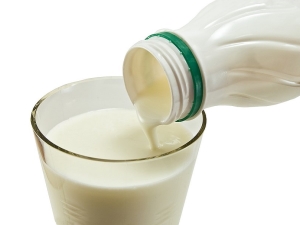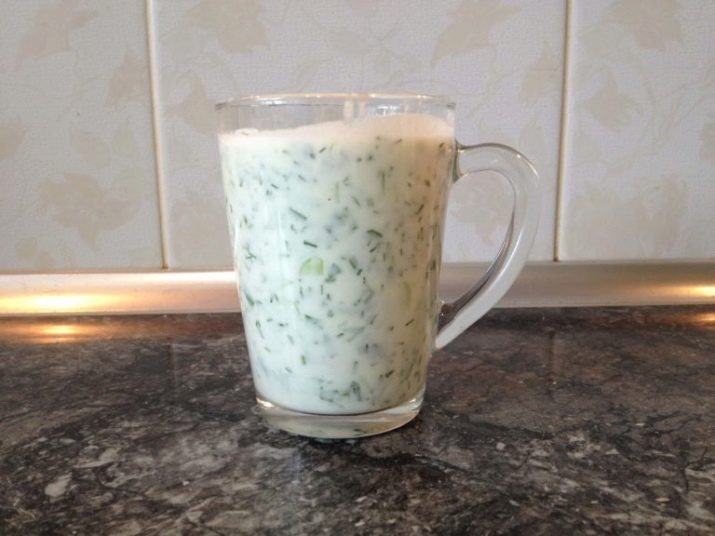Is it possible to use kefir while breastfeeding and what are the contraindications?

It's no secret that a mother's nutrition is always strongly reflected in the taste, smell and quality of her milk. Many books, articles, scientific papers have been written about this, many videos have been shot, but still, the number of these recommendations does not cover all products, or they are simply wrong and erroneous. The use of kefir while breastfeeding is one such controversial issue.

What should be kefir?
Of course, like any product used by mom, it must be fresh. It is obvious that sour or stale kefir can spoil the well-being of even an ordinary healthy person, not to mention a newly-made mother.
Kefir is one of the main products allowed for a woman during the feeding period, therefore, as its beneficial effect, it immediately affects the quality of milk. A fermented milk product can be drunk already in the first months after childbirth.
Another important factor is the fat content of the product. It is not recommended to take too fat or completely fat-free kefir. The reaction of the baby's body can be unpredictable and unexpected.
It is best to cook kefir yourself. The homemade product will not contain preservatives, flavor enhancers, pieces of various fruits of unknown origin. After preparing kefir, you need to let it stand for a day or two, since a fresh product sometimes causes diarrhea and colic.

Beneficial features
The most obvious effect of taking kefir is weight loss. Of course, this is only possible when kefir replaces dinner or another meal. This fermented milk product will help out those mothers who are worried that they have gained weight during pregnancy and are trying to lose it.

It is worth considering other qualities of the drink.
- As mentioned above, fresh homemade kefir has a laxative effect, but a slightly standing product does not have such a strong effect. It improves peristalsis, which starts the process of self-cleaning of the body. There is a purification of both blood and milk.
- Another fermented milk drink normalizes the mother's intestinal microflora. The body of a woman will be better able to absorb certain foods, which will also have a very good effect on the health of the newborn.
- Regular consumption of homemade kefir lowers cholesterol levels, which affects blood vessels and heart function.
- Kefir contains many trace elements. This is known to all calcium, phosphorus, zinc and potassium. Such trace elements strengthen the skeletal system, blood and muscle. They are necessary for a young mother, since during pregnancy a lot of useful substances went into the formation of the baby's body. The fermented milk product is rich in vitamins A, B and E.
- Reduces appetite, gives a feeling of satiety.
- It activates the production of various hormones such as serotonin and melatonin. These substances cheer up mom well.
- Regular consumption of a fermented milk product improves the condition of hair, nails and teeth.

Contraindications
If the benefits of kefir are known and understood, then contraindications to the use of the drink require special attention.
- Baby intolerance to dairy products. This, of course, sounds incredible, but, nevertheless, it happens that the baby is not able to digest dairy products. A characteristic disease is lactose intolerance.
- My mother has the same intolerance. If a woman who is breastfeeding, the body rejects dairy products, it is better not to consume them. Together with allergic reactions and diarrhea, calcium and useful vitamins will be washed out, which will negatively affect the health of the baby.
- Baby's stool problems. If the baby has loose stools, then this is a sign that you need to stop using kefir.
- Uncommon, but possible situations when there was no intolerance to kefir components, but then it appeared. In this case, it is best to immediately find the cause and exclude this product from consumption.
- If mom has food poisoning, take a drink is contraindicated.

How to use?
Kefir, like any product during breastfeeding, a nursing mother should be introduced gradually and in small portions. It should not have a strongly pronounced smell; it should not be made from milk with a specific aroma. Kefir should be stored only in the refrigerator, and no more than three days.

It is best to start using kefir after a month from the birth of a child, half a glass in the afternoon. This should go on for about a week. All this time, you need to carefully monitor the condition of the crumbs.
Observe whether he has developed colic or loose stools that were absent before. Of course, when such ailments appear, you should immediately stop using kefir.
If the baby absorbs milk well, then you can increase the dosage to 2 glasses per day.
Do not mix kefir with other foods such as nuts or seeds.They can cause allergies and are difficult to digest even by an ordinary body, not to mention the body of a woman who has recently given birth and a baby.
Women often wonder if other fermented milk products can be consumed. The reason is clear - homemade sour kefir quickly becomes boring. The recommendation of most doctors is positive - other fermented milk products can be consumed, including sour cream, fermented baked milk and Greek yogurt (but without additives).

What can be mixed with?
The diet of a young mother is most often limited to a few fresh foods, and sometimes even in small volumes. To avoid the feeling of "hard labor", kefir can be consumed along with other products that can diversify the menu.
- One of the most delicious and simple dishes with kefir is everyone's favorite okroshka.
- Kefir with a moderate amount of salt can be used as a salad dressing.
- It is easy to make homemade yogurt from kefir - just add pieces of your favorite fruit to it and grind it in a blender. In the first months of life, you can add bananas, the use of apples and citrus fruits will be undesirable.
- A refreshing cocktail can be called kefir and any greens that are mixed in a blender. If desired, you can make a kefir cocktail sweet or salty, refreshing by adding sugar or mint. The main thing is not to overdo it with volumes and proportions.

Professional opinion
Gynecologists most actively recommend drinking kefir immediately after childbirth. They argue that the reproductive organs of a woman during this period suffer greatly from dysbacteriosis, which sour-milk products will help restore. As a rule, dysbacteriosis in the genitals does not come alone. At the same time, intestinal dysbacteriosis may also occur.In any case, despite the rather dubious effectiveness in terms of treatment, it is much more pleasant to use kefir than to take various drugs, the result of which sometimes remains unclear.
Some therapists recommend drinking kefir because it has the effect of increasing lactation in mothers suffering from a small amount of milk produced.

A relatively reasonable opinion is expressed by pediatricians. They argue that kefir contains many useful elements and vitamins that enrich mother's milk, and therefore recommend its use.
A separate pillar in this topic are the hypotheses of the “school of Dr. Komarovsky”. Evgeny Komarovsky argues that one should not go too far into medical knowledge and recommendations, but it is best for the mother to intuitively monitor her condition and the condition of the child herself. Simply put, see how the child perceives milk after a small amount of kefir, at the end of all observations, decide on your own whether to continue using it or not.

Women's advice
It will not surprise anyone that newly-made mothers are divided into two camps when it comes to the use of kefir during breastfeeding.
Some women argue that kefir should not be drunk, as it causes colic and allergies in the baby.
Others note that it can be introduced into the diet safely, gradually and in small volumes, and then nothing bad will happen.
Among the recommendations, there are those that argue that it is undesirable to mix kefir with other products, especially with pastries in the first three months of a baby's life. But again, everything is individual.
It is noticed that if you drink kefir in the evening, it is more conducive to weight loss. If you use it in the morning or before lunch, then the microflora is restored faster.
The main thing in this matter is to take only high-quality products, and if necessary, immediately stop using kefir.

For information on whether it is possible to drink kefir to a nursing mother in the first month after childbirth, see the next video.

















